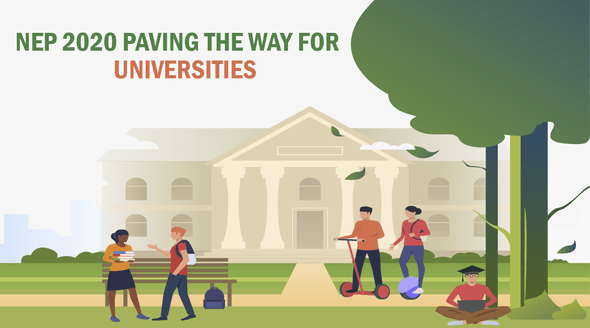 The National Education Policy (NEP) 2020 in India outlines a vision for transforming the education system, including higher education.
The National Education Policy (NEP) 2020 in India outlines a vision for transforming the education system, including higher education.
A Learning Management System (LMS) can play a significant role in addressing several challenges posed by NEP 2020 for universities. Here’s how JhaMobi LMS can contribute to solving these challenges:
1. Flexible Learning Environments: National Education Policy (NEP) 2020 emphasizes flexible and multidisciplinary learning. JhaMobi LMS enables universities to offer a variety of courses, including blended and online learning options, accommodating diverse learning styles and allowing students to choose their learning pathways.
2. Multilingual Content: The policy promotes teaching and learning in regional languages. JhaMobi LMS can host content in all Indian regional languages (Hindi, Marathi, etc) , making education more accessible and inclusive for students who are more comfortable with their native languages.
3. Technology Integration: National Education Policy (NEP) 2020 advocates for technology integration in education. JhaMobi LMS serves as a platform for integrating various digital tools, resources, and interactive content to enhance the learning experience. Integration of LMS with ERP software systems covers MIS/Reporting, Admission Management system, Fee management system resulting in a complete software solution to manage Administration and Academics.
4. Personalized Learning: JhaMobi LMS platform allows universities to implement personalized learning approaches, aligning with NEP’s focus on catering to individual student needs, interests, and paces of learning.
5. Continuous Assessment: The policy suggests moving towards continuous assessment. JhaMobi LMS systems facilitate regular assessments through quizzes, assignments, and discussions, providing immediate feedback to students and helping educators track progress.
6. Teacher Professional Development: JhaMobi LMS platform can offer training modules and resources for faculty development, enabling educators to enhance their teaching methodologies and stay updated on best practices.
7. Quality Content: National Education Policy (NEP) emphasizes the creation of high-quality content. JhaMobi LMS system supports content creation, curation, and sharing, ensuring that students have access to up-to-date and relevant learning materials.
8. Teacher-Student Interaction: JhaMobi LMS enhances teacher-student interaction through online discussions, forums, and messaging, fostering a collaborative and engaging learning environment as recommended by National Education Policy (NEP).
9. Efficient Resource Management: The LMS centralizes content management, reducing the need for physical resources and improving resource utilization, aligning with NEP’s emphasis on efficient resource management.
10. Data-Driven Decision Making: LMS systems provide data analytics on student performance and engagement. Universities can use this data to make informed decisions about curriculum design, teaching methods, and student support services.
11. Equitable Access: NEP aims to provide equitable access to education. JhaMobi LMS enables universities to offer online and distance learning, expanding educational opportunities to students who may not have access to traditional classroom settings.
12. Global Collaboration: The policy encourages global collaborations. JhaMobi LMS facilitates collaboration with international universities, allowing students to engage in joint projects, discussions, and courses across borders.
13. Assessment Reforms: LMS platforms support various forms of assessment, aligning with NEP’s focus on moving away from rote learning and promoting critical thinking, creativity, and analytical skills.
14. Transparent Evaluation: JhaMobi LMS can provide a transparent evaluation by sharing assessment criteria, grading rubrics, and performance feedback, promoting transparency and consistency in evaluation practices.
15. Parent and Stakeholder Engagement: LMS systems can offer portals for parents and stakeholders to track student progress, fostering communication and involvement, in line with NEP’s focus on community engagement.
In summary, JhaMobi LMS can effectively address many challenges presented by NEP 2020 for universities by providing a versatile platform that supports flexible learning, technology integration, personalized education, continuous assessment, and various other aspects that align with the policy’s vision for transforming higher education in India.

 The National Education Policy (NEP) 2020 in India outlines a vision for transforming the education system, including higher education.
The National Education Policy (NEP) 2020 in India outlines a vision for transforming the education system, including higher education.